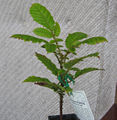Davidsonia pruriens
| Davidsonia pruriens | |
|---|---|

| |
| Scientific classification | |
| Kingdom: | Plantae |
| Clade: | Tracheophytes |
| Clade: | Angiosperms |
| Clade: | Eudicots |
| Clade: | Rosids |
| Order: | Oxalidales |
| Family: | Cunoniaceae |
| Genus: | Davidsonia |
| Species: | D. pruriens |
| Binomial name | |
| Davidsonia pruriens | |
Davidsonia pruriens, also known as ooray, Davidson's plum, or Queensland Davidson's plum, is a medium-sized rainforest tree of northern Queensland, Australia.[1][2]
The leaves are large and compound. The edible dark burgundy colored fruit is produced in large clusters from the branches or the trunk, depending on the type. There are at least two distinct forms, with a suggestion that one of these is an undescribed species.[3]
The indigenous name - ooray - is being increasingly used by growers and processors.
Habitat
Various types of wetter, primary rainforests, at elevations from sea level to 1,000 metres.
Uses
The tree is cultivated to a limited extent for its sour fruit, which is used to make jam, sauces, cordial and wine. The fruit is high in antioxidant activity.[4]
Gallery
- Davidsonia pruriens flowers
- Davidson's plum seedling, Davidsonia pruriens - showing its characteristic toothed leaves.
References
- ^ Davidson's plum profile Australian Native Food Industry Limited. Retrieved 13 Mar 2013.
- ^ F.A.Zich; B.P.M.Hyland; T.Whiffen; R.A.Kerrigan (2020). "Davidsonia pruriens". Australian Tropical Rainforest Plants (RFK8). Centre for Australian National Biodiversity Research (CANBR), Australian Government. Retrieved 27 May 2021.
- ^ "Botanical Information - Native Rainforest Plum (Davidson's Plum)". Native Rainforest Plum.com. Archived from the original on 3 March 2016. Retrieved 28 May 2021.
- ^ Zhao, J.; Agboola, S. (2007). Functional Properties of Australian Bushfoods (PDF). Publication No. 07/030. Rural Industries Research and Development Corporation. Retrieved 13 March 2013.
External sources
- Ooray name origin
- Konczak, Izabela (2009). Health Benefits of Australian Native Foods - An evaluation of health-enhancing compounds. Australian Government: Rural Industries Research and Development Association. ISBN 978-1-74151-932-7.


